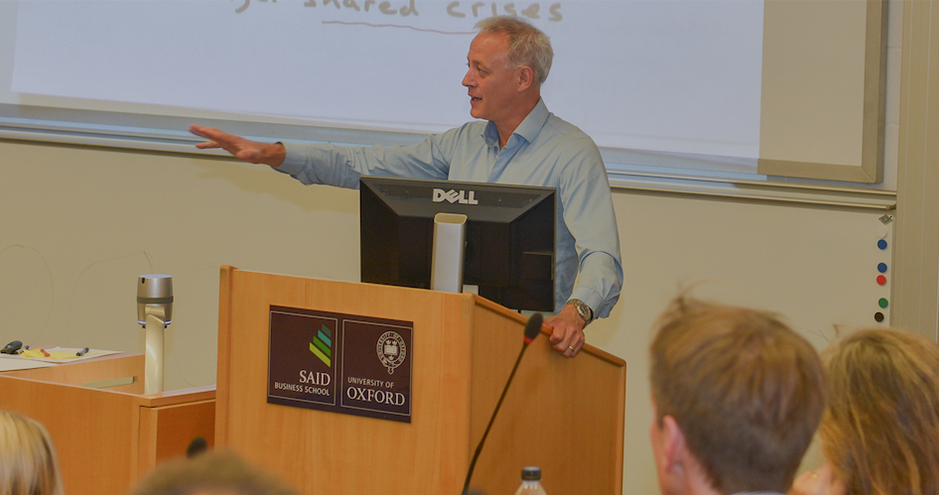HEC Paris and Oxford Saïd mark 15 years of Consulting and Coaching for Change
Alumni, current participants, faculty, and staff celebrate a successful past by looking to the future.

HOW DO WE BRING SUSTAINABILITY INTO THE MAINSTREAM OF BUSINESS PRACTICE?
Should wealth be redefined? How do we help leaders navigate complexity? What kind of business education programme is needed for the future?
These were among the challenging questions debated in the lecture theatres, break-out rooms, and on the patios of Oxford Saïd’s Egrove Park on 23 September 2017 during a celebration of 15 years of CONSULTING AND COACHING FOR CHANGE (CCC), the distinctive 16-month programme run jointly by HEC Paris and Saïd Business School.
A ‘HACKATHON’ OR ‘UNCONFERENCE’
Over 70 alumni, faculty, staff, and current participants – including some future participants – joined the event, which was organised around the theme of sustainability.
Developed by the programme team in collaboration with The Change Leaders (TCL), CCC’s active alumni group, the event took the form of a ‘hackathon’ or ‘unconference’. Oxford Saïd Programme Director Marc Thompson set the scene and the initial challenge, which was broken down into seven themes during small group conversations in the lecture room. Participants then broke into self-organised groups to discuss these themes in greater depth, before regrouping for a thought-provoking talk by Gareth Morgan, Associate Fellow, Saïd Business School.
KEEP ON INSPIRING EACH OTHER
There were some surprises – not least the sudden metamorphosis of one alumnus into an Occupy protestor – many new ideas and even more laughs.
Speaking before the dinner, Marc Thompson paid tribute to the programme’s founding faculty members who took part during the day: Elizabeth Howard, Rafael Ramirez, and Keith Ruddle. He also praised TCL for helping to organise the event, which formed part of their bi-annual conference:
One of the great things about the CCC programme is how vibrant its alumni community is. It’s self-organising and self-managing, sustains itself incredibly well, puts on wonderful programmes and it’s really a treasure." — Marc Thompson
HEC’s Mathis Schulte spoke about the importance of the partnership in creating and running the programme.
This is not how we usually do things. Universities usually like to stay in their ivory towers and not work with each other. But our collaboration has lasted for 15 years, and we ourselves have learned a lot about change in the process, by managing our own relationship." — Mathis Schulte
PARTICIPANTS OBSERVED:
"The value of this community is enormous I think because we keep on inspiring each other and we keep on reinforcing the learning that we had on the programme… It means a lot to me to be part of it, personally and also professionally."
"I work on the edge of international development. Thanks to the programme I have been able to bring the gift of understanding complexity, and facilitating a dialogue with many, many voices. I am thankful for that, and thankful to belong to this family and community."
"When you’re in the middle of the programme, you’re working at your job, you’re working at the programme, and you’re working on yourself at the same time… It takes you a while, even after the programme, to find out what it is that you have learned. So in this practice, this notion of becoming a reflective practitioner, you really find out what it is that you actually learned."

Academic Director and Fellow, Saïd Business School, University of Oxford
Leadership & Change Management - Coaching